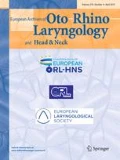Abstract
The aim of present study was to determine the psychiatric symptoms and comorbidities in patients affected by tinnitus. The study sample, between June 2004 and September 2005, consisted of 180 Turkish adults living in Elazıg. Ninety consecutive tinnitus patients were enrolled on their first visit to the outpatients clinic. Control subjects were recruited partly from the social surroundings of the authors. All subjects with significant medical and/or psychiatric pathologies, such as schizophrenia, manic-depressive psychosis, dementia, and behavioural disorders with social withdrawal or suicidal risk, were excluded, as were those unwilling to take part in the study. For the psychopathological examination, patients underwent the Structured Clinical Interview for DSM-III-R (SCID-I, SCID-II). Beck Depression Inventory (BDI), Beck Anxiety Inventory (BAI), Symptom Check list-90 (Revised) (SCL-90-R) were also administered to patients with tinnitus and control subjects. SCL-90-R subscales scores, Beck Anxiety Inventory and Beck Depression Inventory scores were significantly higher in tinnitus patients than in normal control subjects. Twenty-four patients (26.70%) with tinnitus had at least one psychiatric diagnosis. Five control subjects (5.60%) had at least one psychiatric diagnosis. There were significant differences between the two groups (P < 0.001). Anxiety disorders and somatoform disorders were significantly higher in tinnitus patients than in normal control subjects. We conclude that psychiatric symptoms (such as symptoms of anxiety, depression or somatization) among patients with tinnitus should alert clinicians for the presence of a chronic and complex psychiatric condition (Axis-I and Axis-II disorders).
Similar content being viewed by others
References
Andersson G, McKenna L (1998) Tinnitus masking and depression. Audiology 37:174–182
Andersson G (2002) Psychological aspects of tinnitus and the application of cognitive-behavioral therapy. Clin Psychol Rev 22(7):977–990
Anderson G, Carlbring P, Kaldo V, Strim L (2004) Screening of psychiatric disorders via the Internet. A pilot study with tinnitus patients. Nord J Psychiatry 58(4):287–291
Beck AT (1961) An inventory for measuring depression. Arch Gen Psychiatry 4:561–571
Beck AT, Epstein N, Brown G, Steer RA (1988) An Inventory for measuring clinical anxiety:Psychometric properties. J Consult Clin Psychol 56:893–897
Brown RD, Penny JE, Henley CM, Hodges KB, Kupetz SA, Glenn DW, Jobe JC (1981) Ototoxic drugs and noise. Ciba Found Symp 85:151–171
Coskunol H, Bagdiken I, Sorias S, Saygili R (1994) SCID-II Türkce versiyonunun gecerlik ve güvenilirligi (The reliability and validity of the SCID-II Turkish Version). Türk Psikoloji Dergisi 9:2629
Dağ İ (1991) Belirti tarama listesi (SCL 90-R)’nin üniversite öğrencileri için güvenilirliği ve geçerliliği. Türk Psikiyatri Dergisi 2(1):5–12
Derogatis LR (1977) SCL-90: Administiration, Scoring and procedure Manual-I for the revised version. John Hopkins Univ, School of Medicine, Clinical Psychometric Unit, Baltimore
Dobie RA (1999) A review of randomized clinical trials in tinnitus. Laryngoscope 109:1202–1211
Heller AJ (2003) Classification and epidemiology of tinnitus. Otolaryngol Clin North Am 36(2):239–248
Hisli N (1989) Beck Depresyon Envanterinin üniversite öğrencileri için geçerliliği, güvenirliliği. Psikoloji Dergisi 7:3–13
Holgers KM, Zöger S, Svedlund J, Erlandsson SI (1999) Psychiatric profile of tinnitus patients referred to an audiology clinic. In: Proceedings of the Sixth International Tinnitus Seminar, Cambridge, pp 283–285
Holgers KM, Erlandsson SI, Barrenas ML (2000) Predictive factors for audiotory, somatic and depression/anxiety related tinnitus. Audiology 39:284–291
Johnson RM, Brummett R, Schleuning A (1993) Use of alprazolam for relief of tinnitus. A double-blind study. Arch Otolaryngol Head Neck Surg 119:842–8454
Laurıkaınen E, Johansson R, Akaan-Penttıla E, Haapanıemı J (2000) Treatment of severe tinnitus. Acta Otolaryngol Suppl 543:77–78
Lenarz Th (1986) Treatment of tinnitus with lidocaine and tocainide. Scand Audiol Suppl 26:49–51
Marciano E, Carrabba L, Giannini P, Sementina C, Verde P, Bruno C, Di Pietro G, Ponsillo NG (2003) Psychiatric comorbidity in a population of outpatients affected by tinnitus. Int J Audiol 42:4–9
Moller AR (2006) Neural plasticity in tinnitus. Prog Brain Res 157:365–372
Nicolas-Puel C, Akbaraly T, Lloyd R, Berr C, Uziel A, Rebillard G, Puel JL (2006) Characteristics of tinnitus in a population of 555 patients: specificities of tinnitus induced by noise trauma. Int Tinnitus J 12(1):64–70
Rosenberg SI, Silverstein H, Rowan T, Olds MJ (1998) Effect of melatonin on tinnitus. Laryngoscope 108:305–310
Schleuning AJ (November 1991) Management of the patient with tinnitus. Med Clin North Am 75(6):1225–1237
Sismanis A (2003) Tinnitus. Advances in evaluation, management. Otolaryngol Clin North Am 36(2):11–12
Spitzer RL, Williams JBW, Gibbon M (1987) Structured clinical interview for DSM-III-R (SCID). Biometrics research, New York State Psychiatric Institute, New York
Spitzer RL, Williams JBW, Gibbon M (1987) Structured clinical interview for DSM-III-R personality disorders (SCID-II). Biometrics research, New York State Psychiatric Institute, New York
Sorias S, Saygılı R, Elbi H (1990) DSM-III-R yapılandırılmış klinik görüşmesi Türkçe versiyonu (SCID). Ege Üniversitesi Basımevi, Bornova
Ulusoy M, Şahin N, Erkmen H (1998) Turkish version of The Beck Anxiety Inventory: psychometric properties. J Cognit Psychother 12:163–172
Ziger S, Svedlund J, Holgers KM (2001) Psychiatric disorders in tinnitus patients withouth severe hearing impairments: 24 month follow-up patients at an audiological clinic. Audiology 40(3):133–140
Author information
Authors and Affiliations
Corresponding author
Rights and permissions
About this article
Cite this article
Belli, S., Belli, H., Bahcebasi, T. et al. Assessment of psychopathological aspects and psychiatric comorbidities in patients affected by tinnitus. Eur Arch Otorhinolaryngol 265, 279–285 (2008). https://doi.org/10.1007/s00405-007-0440-8
Received:
Accepted:
Published:
Issue Date:
DOI: https://doi.org/10.1007/s00405-007-0440-8




